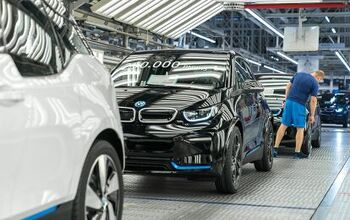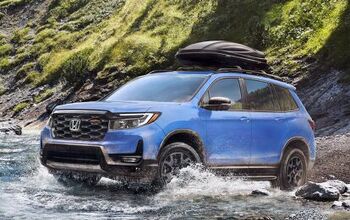Ford Teams Up With Rivian, Greases the Wheels With Half a Billion Dollars

Not long ago, it was expected that General Motors would sink a pile of cash into upstart electric automaker Rivian. Instead, GM held its horses while Amazon plunked down a $700 million investment in the Michigan-based company.
Now, Ford Motor Company is filling GM’s shoes, offering up half a billion dollars and announcing a co-developed product with the EV company, creator of the long-range R1T pickup and R1S electric three-row SUV. The big question now is: what form will that vehicle take?
Rivian makes no bones about its desire to partner with other automakers and offer its “skateboard” EV platform — with integrated quad-motor powertrain — to those who want it. Well, Ford wants it.
The Blue Oval claims the investment will birth an “all-new, next-generation battery electric vehicle” for the company.
Rivian’s skateboard is a flexible architecture with three available battery sizes, the largest of which is said to propel its R1S a total of 410 miles. Range like this would give any automaker a leg up on competitors struggling to develop such a vehicle in-house. The company’s Plymouth, Michigan HQ and engineering center is strategically positioned to woo Detroit automakers while tapping into the region’s deep pool of suppliers.
Bolstering its appeal are electrical/tech facilities in southern California, with an abandoned Mitsubishi plant in Normal, Illinois (purchased for a song) serving as a production site.
“Ford has a long-standing commitment to sustainability, with [Chairman] Bill Ford being one of the industry’s earliest advocates, and we are excited to use our technology to get more electric vehicles on the road,” said Rivian founder and CEO RJ Scaringe.
While the R1T, scheduled for production in late 2020, has been paraded around to various auto shows already, the company uses Ford F-150 bodies for its test mules. Who know the maker of those bodies would take the plunge?
“As we continue in our transformation of Ford with new forms of intelligent vehicles and propulsion, this partnership with Rivian brings a fresh approach to both,” said Jim Hackett, Ford president and CEO, in a statement. “At the same time, we believe Rivian can benefit from Ford’s industrial expertise and resources.”
Ford stresses that the two existing EV products in its pipeline — a Mustang-inspired crossover due next year and a future electric F-150 — are still a go. In a Wednesday Twitter reply, company spokesman Mike Levine stated, “Ford’s battery electric F-150 has been under development for some time and will continue as planned.”
Nor will the pair-up with Rivian impact talks with alliance partner Volkswagen, which is expected to give Ford access to its MEB electric vehicle architecture. As MEB underpins a range of small- to medium-sized vehicles in VW’s future lineup, it can be assumed that Ford has a large electric SUV in mind for Rivian’s platform.
As reported by Automotive News‘ Mike Martinez, Hackett claims, “This is a specific platform that helps us in an area we weren’t considering with others.”
Again, a big, green SUV seems the likely end result of the Rivian pair-up.
Ford’s $500 million investment, after securing regulatory approval, will see Joe Hinrichs, Ford’s president of Automotive, take a seat on Rivian’s seven-member board.
[Images: Rivian Automotive]

More by Steph Willems
Latest Car Reviews
Read moreLatest Product Reviews
Read moreRecent Comments
- Theflyersfan The wheel and tire combo is tragic and the "M Stripe" has to go, but overall, this one is a keeper. Provided the mileage isn't 300,000 and the service records don't read like a horror novel, this could be one of the last (almost) unmodified E34s out there that isn't rotting in a barn. I can see this ad being taken down quickly due to someone taking the chance. Recently had some good finds here. Which means Monday, we'll see a 1999 Honda Civic with falling off body mods from Pep Boys, a rusted fart can, Honda Rot with bad paint, 400,000 miles, and a biohazard interior, all for the unrealistic price of $10,000.
- Theflyersfan Expect a press report about an expansion of VW's Mexican plant any day now. I'm all for worker's rights to get the best (and fair) wages and benefits possible, but didn't VW, and for that matter many of the Asian and European carmaker plants in the south, already have as good of, if not better wages already? This can drive a wedge in those plants and this might be a case of be careful what you wish for.
- Jkross22 When I think about products that I buy that are of the highest quality or are of great value, I have no idea if they are made as a whole or in parts by unionized employees. As a customer, that's really all I care about. When I think about services I receive from unionized and non-unionized employees, it varies from C- to F levels of service. Will unionizing make the cars better or worse?
- Namesakeone I think it's the age old conundrum: Every company (or industry) wants every other one to pay its workers well; well-paid workers make great customers. But nobody wants to pay their own workers well; that would eat into profits. So instead of what Henry Ford (the first) did over a century ago, we will have a lot of companies copying Nike in the 1980s: third-world employees (with a few highly-paid celebrity athlete endorsers) selling overpriced products to upper-middle-class Americans (with a few urban street youths willing to literally kill for that product), until there are no more upper-middle-class Americans left.
- ToolGuy I was challenged by Tim's incisive opinion, but thankfully Jeff's multiple vanilla truisms have set me straight. Or something. 😉




































Comments
Join the conversation
Hypothesis: Let's face it, GM and Ford are pretty backward technologically - this is why when they need new tech they generally buy it rather than develop it in-house. Hypothesis is open to testing. I'll wait here while you list the 15-20 most significant new technologies which GM and Ford have introduced in the 21st century. (Adapting technologies from other industries a decade or more after they were pioneered does not count. Supplier innovations receive partial credit.)
Hypothesis: No one here really knows dick about the future other than it is a variation on the present.